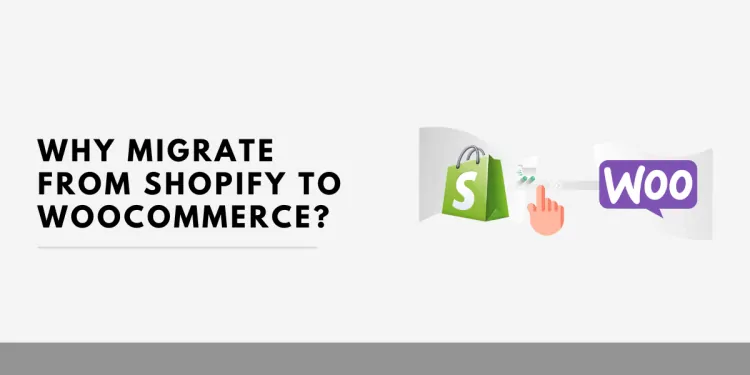Why Migrate from Shopify to WooCommerce?
Discover the key benefits of migrating from Shopify to WooCommerce, including lower costs, greater flexibility, better SEO, and full control over your store.

Migrating from Shopify to WooCommerce is a strategic move for many eCommerce businesses seeking greater control, flexibility, and cost-effectiveness. While Shopify is a popular hosted platform known for its ease of use, WooCommerce, a WordPress-based solution, offers several compelling advantages that can better align with your business goals. In this blog, we’ll explore the key reasons why businesses choose to migrate Shopify to WooCommerce and how this transition can benefit your online store.
1. Greater Flexibility and Customization
One of the primary reasons to migrate from Shopify to WooCommerce is the enhanced flexibility and customization options available with WooCommerce. Unlike Shopify, which has limitations on theme and app customizations, WooCommerce provides:
- Unlimited Design Customization: With WooCommerce, you have complete control over your store’s design. Choose from thousands of WordPress themes or create a custom design tailored to your brand.
- Advanced Functionality: Customize your store’s functionality using a wide range of plugins. Whether you need advanced product options, custom shipping methods, or specific integrations, WooCommerce allows for extensive modifications.
This level of control enables you to build a unique shopping experience that can set your store apart from competitors.
2. Lower Long-Term Costs
Migrating from Shopify to WooCommerce can be cost-effective in the long run. While Shopify has a monthly subscription fee that can increase with added features, WooCommerce itself is free, and many of its essential plugins and themes are available at reasonable prices.
- No Transaction Fees: Shopify charges transaction fees unless you use their payment gateway. With WooCommerce, you’re not subject to these fees, which can result in significant savings.
- Affordable Hosting: WooCommerce requires a hosting provider, but many affordable options are available. As your store grows, you can scale your hosting plan to fit your needs without substantial price hikes.
By reducing these ongoing costs, WooCommerce can provide a more budget-friendly solution for managing and scaling your online store.
3. Enhanced SEO Capabilities
Migrating from Shopify to WooCommerce can improve your SEO efforts thanks to WooCommerce’s strong integration with WordPress, the world’s leading content management system (CMS). WooCommerce offers:
- Advanced SEO Plugins: Utilize powerful SEO plugins like Yoast SEO or Rank Math to optimize your product pages, blog posts, and categories for search engines.
- Flexible URL Structures: Customize URL slugs and permalinks to create SEO-friendly URLs that help improve search rankings.
The robust SEO tools and capabilities of WooCommerce can help drive more organic traffic to your store, enhancing your visibility and attracting more customers.
4. Ownership and Control
With WooCommerce, you gain full ownership and control over your online store. Unlike Shopify’s hosted environment, which limits access to certain files and settings, WooCommerce allows you to:
- Access Your Code: Customize and modify your site’s code, theme, and plugins to fit your exact needs.
- Manage Data: Have complete control over your store’s data, including customer information, sales reports, and inventory.
This level of control ensures that you can tailor your store to meet your specific requirements and make adjustments as needed without restrictions imposed by a third-party platform.
5. Scalability and Growth Potential
Migrating from Shopify to WooCommerce offers excellent scalability, accommodating the growth of your online business. WooCommerce’s modular design allows you to:
- Expand Your Store: Add new features and functionalities as your business grows, including advanced product variations, subscription services, and membership options.
- Integrate with Other Tools: Seamlessly integrate with various tools and services, including CRM systems, email marketing platforms, and analytics solutions.
This scalability ensures that WooCommerce can grow with your business, providing the tools and capabilities needed to support increasing traffic and sales.
6. Better Integration with WordPress Ecosystem
WooCommerce is built on WordPress, giving you access to a vast ecosystem of plugins and themes. This integration provides:
- Content Management: Easily manage and publish content such as blog posts, landing pages, and media, enhancing your marketing and engagement strategies.
- WordPress Plugins: Leverage the extensive library of WordPress plugins for additional features, such as security, backups, and performance optimization.
This seamless integration with WordPress allows you to create a comprehensive online presence that goes beyond just eCommerce.
7. Robust Community and Support
When you migrate from Shopify to WooCommerce, you join a large and active community of WordPress and WooCommerce users. Benefits include:
- Community Support: Access forums, tutorials, and online resources to help with troubleshooting and optimizing your store.
- Professional Services: Find a wide range of developers, designers, and consultants specializing in WooCommerce to assist with customizations and support.
This vibrant community and professional network provide valuable resources and assistance to help you maximize the potential of your WooCommerce store.
Conclusion: Why Migrate from Shopify to WooCommerce?
Migrating from Shopify to WooCommerce offers several key benefits, including greater flexibility, lower long-term costs, enhanced SEO capabilities, and full ownership of your online store. WooCommerce’s robust customization options, scalability, and integration with the WordPress ecosystem make it an attractive choice for businesses looking to optimize their eCommerce operations.
If you’re seeking a platform that provides more control, cost savings, and growth potential, migrating to WooCommerce could be the right move for your business. By making the switch, you can harness the power of WooCommerce to build a more dynamic and successful online store.
What's Your Reaction?















